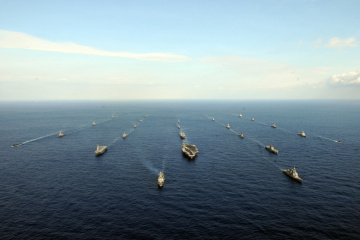
Winslow Wheeler, clearly a bit of a defense-waste firebrand, takes on AirSea Battle and the whole pivot logic.
I couldn't agree more.
The best bits:
It’s old, and likely thoroughly forgotten now, but last summer the Washington Post ran an excellent article on the U.S. military‘s “pivot” toward Asia, its origins, and its budget implications. It presented some meaningful background on where the pivot came from, and how it so quickly became dogma in Washington as the decade-long ground wars receded in the national rear-view mirror ...
I urge you to read the piece: the pivot is not just a redirection of attention toward Asia; it is a proclamation of a new form of warfare, Air-Sea Battle, to solve the problem of defeating China’s presumed military ambitions in the Pacific with an assemblage of existing and new long-range, precision-strike weapons.
It is the brainchild of Andrew Marshall, the long-sitting director of the Pentagon’s Office of Net Assessment ...
The Air Force and the Navy are particularly enthusiastic about Air-Sea Battle; after a decade of budget emphasis on the Army and Marine Corps in the mostly-land conflicts in the Persian Gulf and Southwest Asia, ASB is so much all about the Navy and Air Force that, according to Jaffe’s article, they have “come up with more than 200 initiatives they say they need to realize Air-Sea Battle” and it “provides a framework for preserving [and expanding] some of the Pentagon’s most sophisticated weapons programs.”
The heavy bill for the hardware Air-Sea Battle contemplates was noted, last August, by numerous skeptics. In Jaffe’s article, Barry Posen—the director at MIT’s Security Studies Program—pointed out Marshall’s history of rationales for what is now called Air-Sea Battle saying “it should be called the Office of Threat Inflation.” As well, Jaffe quotes the Marine Corps—likely to lose big chunks of budget share under ASB—saying in a contracted study it would be “preposterously expensive.”
It is America’s new strategic fixation—even if some would argue that it doesn’t even qualify as a strategy, and is simply a shift of bureaucratic spending priorities for hardware garbed in pseudo-strategic talk ...
The focus on historically under-performing hardware, especially the long range—“global”—variety, displaces the higher-level thinking now needed. We must contemplate how to leverage China’s geographical disadvantage of being literally surrounded by actively-antagonistic and potentially-hostile neighbors: Russia, India, Japan, South Korea, Taiwan and Vietnam ...
Worst of all, ASB presumes a new Cold War with China to sustain the Pentagon’s own budget, thereby swapping strategic thought with material considerations.
Panetta proclaims that the “doomsday” of the sequester of the defense budget—in all, nearly a 10% cut in spending over the coming decade—would require him and the Administration to come up with a whole new strategy.
Indeed; what a tragedy that would be ...
Watch Hagel closely on these issues ... it will be interesting to see if he leaves even the tiniest amount of daylight between himself and these strategically bankrupt ideas.
Read the entire piece here.